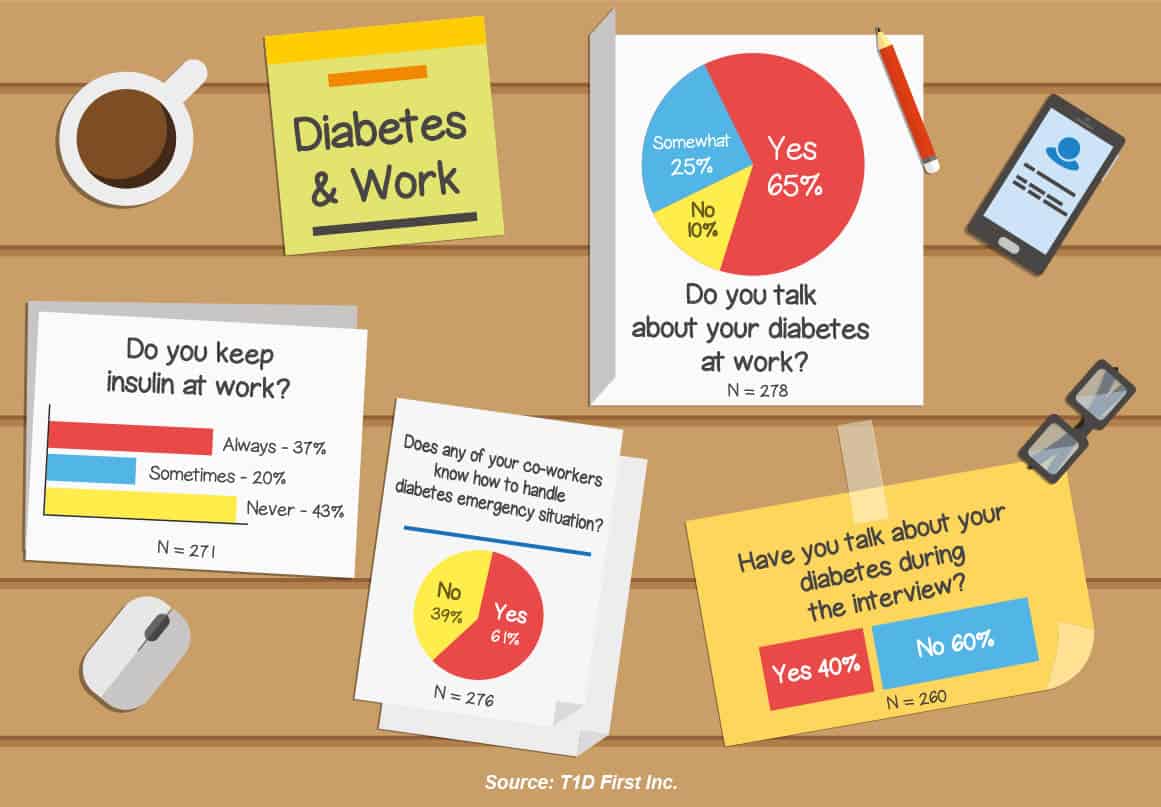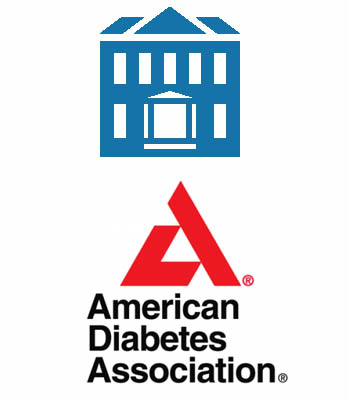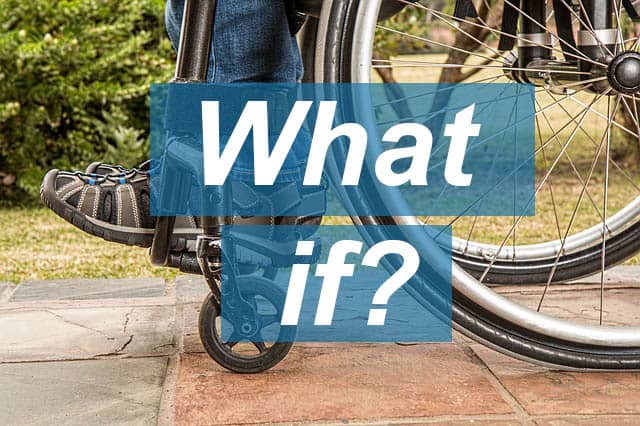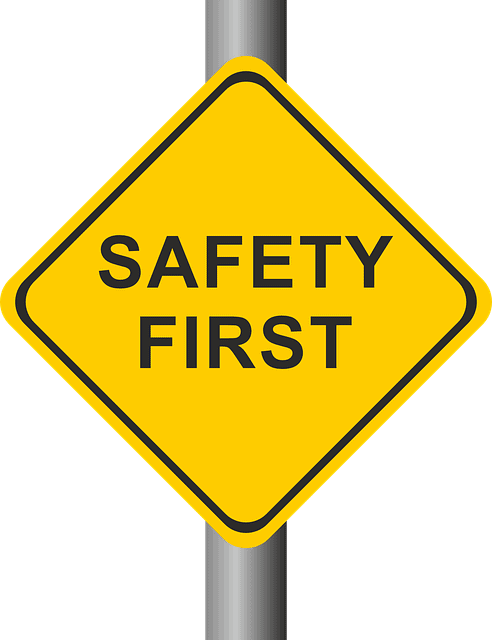
This is the question that Aidan sent to The Diabetes Council last week: Can you work if you have diabetes?
Of course you can work if you have diabetes, or can you?
Seemingly this is a simple question, but there are three answers:
- Yes
- No
- Maybe – you can work if you have diabetes by fighting the system
Contents
- Careers that you cannot have with diabetes
- ADA work accommodations
- What if your diabetes causes disability?
- How do I qualify for disability benefits with diabetes?
- What happens if I am denied disability benefits?
- When your diabetes does not limit your ability to work
- How can I be safe with diabetes at work?
- What are employers doing to keep their employees healthy?
- Why is it hard to have any career you want with diabetes?
- Over to you
Careers that you cannot have with diabetes
There are some careers that preclude you from working as a person with diabetes. These careers are not open to people with diabetes who are taking insulin. For example, if you have Type 1 diabetes, you are not allowed to pilot a plane commercially in the United States, no matter how well controlled your diabetes is. The FAA currently will not allow it.
However, if you want to pilot a plane in Canada or the United Kingdom, there are regulations set up that allow persons with Type 1 diabetes who are in good control of their diabetes to pilot a plane commercially.
We have looked at a lot of different careers at The Diabetes Council. We have looked at whether or not you can be in the military with diabetes, be a firefighter or a law enforcement officer with diabetes, astronaut, work as an EMT/paramedic, a long-distance truck driver, or be a pilot with diabetes. Soon, we will look at whether or not you can be a flight attendant with diabetes.
Please read the articles above to find out what the specifics of working in these careers with diabetes are, and what kind of rules and regulations you must follow.
The careers we have looked at so far all have certain rules and regulations that apply to people with diabetes. These rules and regulations are put into place to ensure the safety of the employee with diabetes, and also the safety of the general public. For example, a pilot with poorly controlled diabetes who has a low blood sugar could crash a plane and kill hundreds of people.
There are other jobs where safety may be an issue. What about plant shift workers who work with heavy machinery and work long hours with few breaks? You can work in these jobs if you have diabetes, but you may run into some discrimination issues and safety issues.
You need to know that you have the Americans with Disabilities Act (ADA) behind you. There is a wealth of information on work-related discrimination issues around diabetes on the American Diabetes Association website for you to research: http://www.diabetes.org/living-with-diabetes/know-your-rights/discrimination/employment-discrimination/
On their website, you will find information on employment discrimination and your rights, diabetes employment resources, accommodations in the workplace, and more.
On employment applications, you may have noticed that you are required to answer the question related to whether or not you have a disability. However, you can pick, “yes,” “no,” or “do not wish to answer.” This is because employers are not allowed to discriminate against you in the workplace under the law.
If you want to read more interesting articles check these out:
The following is a definition of what the American Disabilities act is, and pertains to according to the US Equal Employment Opportunity Commission, or EEOC:
Some interesting figures and numbers to take a look at:

ADA work accommodations
You may be able to secure a number of accommodations that are afforded by the ADA. Some examples of accommodations for diabetes in the workplace include:
High or low blood sugar:
-
- provide storage for food and medications
- provide an area where the employee may privately test their blood sugars
- Provide a private area to administer insulin injections
- Provide sharps containers for needle disposal
- Provide a private area to recover from a low blood sugar
- Allow for extra breaks as necessary for food and to go to the bathroom
- Provide a table at office functions with diabetes-friendly foods
Nerve damage:
- provide assistive devices that help with fine motor skills
- Provide personal protective equipment (PPE)
- remove use of sharp objects from job functions
- provide an area where a person with diabetes with fatigue can rest during lunch break
- modify work desks to allow for sitting or standing
- allow the person with diabetes to park closer to the building if necessary
Diabetes Fatigue:
- allow for rest breaks, yoga mat, quiet room
- provide assistance with heavy lifting or activities requiring physical strength and energy
- Allow job sharing
- Shorten work day and extend work week
Vision problems:
- consider magnification software for computer
- consider Braille; touch graphics, or assistive technology (software that reads the screen)
- use high contrast
- Provide a qualified reader and consider using a digital recorder
- If public transportation is used, allow extra time to get to work
- Allow the person to use a service dog
- for photosensitivity, consider low lighting and removal of fluorescent lighting
Kidney Disease:
- move work area close to the rest rooms
- Allow time off from work for dialysis
- consider telephonic work for days when fatigue is worse
Cognitive Limitations:
- give one assignment at a time, and in writing
- provide structure in the workplace
- provide the employee with organization tools
- Remind the employee of important tasks and deadlines
- allow for flexible work hours
- keep distractions to a minimum
Psychological Limitations:
- Minimize workplace stress
- Provide flexible schedule for counseling if needed
Other Considerations:
- provide area where employee can brush their teeth
- take an inventory of any safety hazards in the workplace, and fix them.
- take care to keep temperatures in a normal range, and avoid extremes of heat or cold (for circulation problems)
- provide education to anyone who will work with the person with diabetes on signs and symptoms or low and high blood sugar, and treatment of each2
What if your diabetes causes disability?
If your diabetes, either Type 1 or Type 2, has caused damage to your vital organs due to complications, and which in turn limits your activity, you may be able to apply for Social Security Disability.
The complications of diabetes that can greatly limit your activity and which may render you unqualified for Social Security Disability are:
- vision problems
- kidney disease or failure
- nerve damage causing mobility problems
- high blood pressure
- heart problems
- stroke
- nerve damage that causes problems with digestion
- poor circulation in limbs limiting activity
- severe skin infections and cellulitis
- depression
- amputation of limbs
Additional links I suggest checking out:
- Pramlintide (SymlinPen) Comprehensive Guide for Type 2 Diabetes
- Humalog Vs. Novolog: What’s the Difference?
- 40 Financial Experts Share Ways to Save Money on Diabetes Care
- How Can Your Diabetes Affect Your Friends, Family & Others Around You?
- The Connection Between Diabetes, Heart Disease, And Stroke
How do I qualify for disability benefits with diabetes?
If you have not worked in 12 months, and you do not expect to be able to work for another 12 months, you may be eligible for Social Security disability (SSDI/SSD) benefits or Supplemental Security Income (SSI) benefits. There are certain categories for disability that you will have to meet, and your limitations on activity will need to be severe. Social security has a list of impairments called the “Blue Book,” and Diabetes is no longer a disability listing in and of itself in this book.
Someone who is diagnosed with diabetes may think that they are automatically qualified for disability benefits. However, this is not the case. The complications must fall under one of the disability listings to qualify, and it must severely limit your ability to hold a job. Social security will look at all of your diagnoses, and assessed if combined, do they affect your ability to work. If you can do a seated job, you may be denied.
What happens if I am denied disability benefits?
You can always appeal. The second appeal is through an administrative law judge, and a disability lawyer may be needed to help convince the law judge that the sum total of your diagnoses adds up to an inability to work any job, including sedentary work.3
When your diabetes does not limit your ability to work
Let’s say that you go through this whole disability process, and you find out that you do not qualify - you are not alone. Most people with diabetes will not qualify for disability income.
What happens then?
When you have a necessity to go to work, what can you do to be safe with diabetes at work? What are employers doing to help their employees prevent diabetes and complications of diabetes?
Let’s take a look…
How can I be safe with diabetes at work?
Employees with diabetes can take necessary steps to self-manage their diabetes while at work. This includes keeping all of their needed supplies and medications with them - quick sugar for a low blood sugar, water bottle and ketone sticks if applicable for a high blood sugar.
Employers and co-workers should be aware of their diabetes, and know what to do to assist them in case of a low blood sugar. If they use a glucagon pen, they should train their co-workers on how to use it.
The employee must speak up when a break is needed. Additionally, letting employers know when you need to take time to provide self-care goes a long way in helping prevent low blood sugar incidents on the job.
What are employers doing to keep their employees healthy?
In this day and age, employers are more likely to have intense and well thought out wellness programs for their employees. Employees may meet with health educators periodically to receive health coaching related to their pre-diabetes or diabetes.
Many employers will allow employees to take time off work on paid leave to attend Diabetes Prevention Programs for pre-diabetes or Diabetes Self-Management Programs for diabetes. Insurance may provide incentives for a person with diabetes to attend these programs. Considering that a person with diabetes spends 2.3 times the money on medical care than a person without diabetes, these employers see the value of prevention.4
To plan a wellness program in your workplace, visit www.diabetesatwork.org. They offer a wealth of information on starting a workplace wellness initiative, including resource tools for planning, implementing and measuring return on investment.
Also visit the American Diabetes Association’s page for Stop Diabetes at Work here: http://www.diabetes.org/in-my-community/awareness-programs/stop-diabetes-at-work/
This page includes an employee and employer portal for diabetes prevention programs at work.
Why is it hard to have any career you want with diabetes?
The fact is most careers are possible to have with diabetes. For those you cannot do currently, like pilot a commercial plane with Type 1 diabetes, it is only a matter of time. The United Kingdom and Canada allow pilots with diabetes to fly commercially if they meet all their medical requirements.
Do not let diabetes get in the way of any career you wish to pursue. Take charge of your diabetes, and just as Mary Tyler Moore did back in the 1960’s, give that hat a toss in the wind! “We’re gonna make it!!! We’re gonna make our dreams come true!”
That may seem silly, but Mary Tyler Moore herself was actually an iconic figure as a person with Type 1 diabetes. She was a single woman who made it in a career that was traditionally not meant for women at the time. With every step we take, we get closer to equality in the workplace for diabetes.5
These days, people with diabetes perform all sorts of jobs and are getting into different career paths. They are leading major corporations, protecting the public, and flying private planes, just to name a few.
Still, people with diabetes can be discriminated against in the workplace if they do not know their rights, or do not stand up for themselves. Much of this is due to a misunderstanding of diabetes because many people with diabetes work with few restrictions. The employer may not even be aware of their diabetes.6
More info: Here is the updated link to the LEO guidelines since the one listed did not work. I was one of the authors since I am an endo an also did an occ med residency.
Also, we have been working with AAOHN, the occ med nurses association. We have done a series of webinars and they are on the web site.
Individualized Assessment is key. Every person with or without diabetes cannot do every job. What are the physical requirements of the job? For instance, if a person has unstable retinopathy, heavy lifting probably should not be done.
Talk to your health care provider about your job and how to adjust insulin, diet etc. Be sure to include: shift work, hours worked (how many and what time), how many breaks, location of work (outside, inside, heights), moving equipment (do you operate or are around), physical activity (desk job or spurts of activity) and insulin regimen etc.
Over to you
We encourage our readers to submit their input to this article in the comments section below. Please share your experiences with difficulties you have had trying to break into a particular career and any workplace discrimination you may have experienced. Sharing these scenarios help other PWD’s as they strive to navigate the intricacies of the workforce. Things you share here may help other PWD’s to make great strides in the workplace.
If you have any workplace stories to share concerning diabetes, do so please.
TheDiabetesCouncil Article | Reviewed by Dr. Sergii Vasyliuk MD on June 04, 2020
References
- https://www.eeoc.gov/laws/types/diabetes.cfm
- http://askjan.org/media/diabetes.html
- http://www.disabilitysecrets.com/social-security-disability-diabetes.html
- http://www.webmd.com/diabetes/features/tips-to-help-you-manage-your-diabetes-at-work
- https://diabetesatwork.org/
- http://www.dlife.com/diabetes/lifestyle/work










